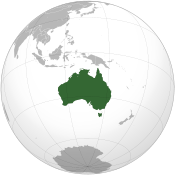An Australian child's vocabulary: it's "I" before "we", both before "you"
Thursday, May 1, 2008
The Oxford University Press in Australia has released a list of the most-used words in a study of nearly 4,000 writing samples from children in their first three years of school. After removing names of people, places and brands, the top 307 words were published. "I" topped the list, with "my" in 7th place and "me" at 33rd. By comparison, "we" came in 9th, "he", "they" and "she" were 13th, 16th and 21st respectively, with "you" at 31st. Family also featured highly in the top 100, including "mum" (34th), "dad" (36th), "brother" (78th) and "sister" (99th), with "friends" making it to 91st place.
Some of the other popular topics on the full list include:
| Animals | Leisure | Fantasy | Places | ||||
|---|---|---|---|---|---|---|---|
| 87 | dog | 23 | played | 166 | fairy | 65 | school |
| 142 | fish | 74 | watched | 215 | castle | 94 | park |
| 150 | cat | 111 | party | 226 | dragon | 203 | beach |
| 228 | rabbit | 128 | playing | 244 | magic | 212 | zoo |
| 266 | animals | 159 | football | 255 | princess | 263 | pool |
| 267 | horse | 162 | bike | 289 | monster | 268 | movies |
| 273 | snake | 165 | TV | 305 | playground | ||
| 280 | shark | 170 | games | ||||
| 300 | dogs | 173 | ball | ||||
| 188 | movie | ||||||
| 189 | soccer | ||||||
| 195 | swimming | ||||||
| 210 | computer | ||||||
| 240 | walk | ||||||
| 256 | shopping | ||||||
| 271 | race | ||||||
| 297 | walked | ||||||
| 301 | footy | ||||||
This word list is the first of its kind to be compiled in Australia in 30 years. The previous list, referred to as the "Salisbury Word List", was based on a 1978-79 study undertaken by the Education Department of South Australia and comprised 2,000 words. A research paper, released in conjunction with the Oxford list, looked into similarities and differences of the words used between children of different generation (based on comparisons with the Salisbury list), gender, ethnic background, socio-economic status, and area of residence (i.e. urban or rural). The paper found a drop in the level of formality of children's writing when compared to the previous list, with words such as "mother", "father", "Mr" and "Mrs" falling out of favour, while the less formal "mum" and "dad" retained their popularity.
The study also found that the children tended to share a common core vocabulary, evident particularly in the top 100 words which varied little according to the various factors, but that differences often highlighted similar differences in cultures. For example, children of a non-English speaking background were more likely to write about less active past-times (such as "movie", "garden" and "computer") and family activities (using words such as "family", "ate" and derivatives of "cousin") than their counterparts, who did not use "cousin" or "family" in their top 100 words, and referred to more active pursuits as "soccer" and "swimming".
While comparisons were made between child vocabularies of other nations, particularly the United Kingdom, the researchers pointed out issues in doing so due to the different methodologies involved. According to the researchers, "[t]he Oxford Wordlist [...] has been presented as a resource freely available to all Australian educators".
Sources
[edit]- Bridie Smith. "Want a word? Here are 307 of the best, according to youngsters" — The Age, May 1, 2008
- Jane Metlikovec. "Australian kids sampled for new Oxford Wordlist" — Melbourne Herald Sun, May 1, 2008
References
[edit]- The Successful Teacher Word List, Oxford University Press, Australia
- Lo Bianco, J., Scull, J., and Ives, D. (2008). "The Words Children Write: Research Summary of the Oxford Wordlist Research Study", Oxford University Press, Australia.





